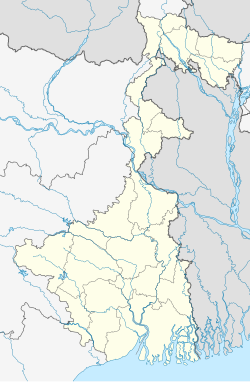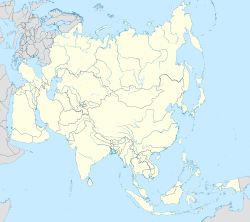This article needs additional citations for verification. (July 2013) |
Kendua is a census town in the Habibpur CD block in the Malda Sadar subdivision of Malda district in the Indian state of West Bengal.
Kendua | |
|---|---|
Census Town | |
| Coordinates: 24°58′59″N 88°14′51″E / 24.9831795°N 88.2475090°E | |
| Country | |
| State | West Bengal |
| District | Malda |
| Area | |
• Total | 1.2 km2 (0.5 sq mi) |
| Population (2011) | |
• Total | 6,452 |
| • Density | 5,400/km2 (14,000/sq mi) |
| Languages | |
| • Official | Bengali[1][2] |
| • Additional official | English[1] |
| Time zone | UTC+5:30 (IST) |
| PIN | 732121 |
| Telephone/ STD code | 03511 |
| ISO 3166 code | IN-WB |
| Vehicle registration | WB |
| Lok Sabha constituency | Maldaha Uttar |
| Vidhan Sabha constituency | Habibpur |
| Website | malda |
Geography
edit10miles
River
River
M: municipal town, CT: census town, R: rural/ urban centre, F: Facility, H: historical centre
Owing to space constraints in the small map, the actual locations in a larger map may vary slightly
Location
editKendua is located at 24°58′59″N 88°14′51″E / 24.9831795°N 88.2475090°E.
Area overview
editThe area shown in the adjacent map covers two physiographic regions – the Barind in the east and the tal in the west. The eastern part is comparatively high (up to 40 metres above mean sea level at places) and uneven. The soils of the eastern region are “hard salty clays of a reddish hue and the ground is baked hard as iron.” It lies to the east of the Mahananda River. The area lying to the west of the Mahananda River, the tal, is a flat low land and “is strewn with innumerable marshes, bils and oxbow lakes.” The tal area is prone to flooding by local rivers.[3] The total area is overwhelmingly rural.[4][5] There are two important historical/ archaeological sites in the area – Pandua and Jagjivanpur.[6]
Note: The map alongside presents some of the notable locations in the area. All places marked in the map are linked in the larger full screen map.
Demographics
editAccording to the 2011 Census of India, Kendua had a total population of 6,452, of which 3,296 (51%) were males and 3,156 (49%) were females. Population in the age range 0–6 years was 673. The total number of literate persons in Kendua was 4,614 (79.84% of the population over 6 years).[7]
As of 2001[update] India census, Kendua had a population of 5,768. Males constitute 51% of the population and females 49%. Kendua has an average literacy rate of 62%, higher than the national average of 59.5%: male literacy is 71%, and female literacy is 53%. In Kendua, 13% of the population is under 6 years of age.[8]
Infrastructure
editAccording to the District Census Handbook, Maldah, 2011, Kendua covered an area of 1.2 km2. It had 3 km roads with both open and closed drains. The protected water-supply involved overhead tank, tap water from treated sources, tube well/ bore well. It had 608 domestic electric connections. Among the educational facilities, it had 1 primary school in town, the nearest secondary school at Kachu Pukur 3 km away. It had 1 non-formal education centre (Sarva Shiksha Abhiyan). Among the social, cultural and recreational facilities it had 1 public library. It produced mustard oil, beedi, paddy.[9]
References
edit- ^ a b "Fact and Figures". www.wb.gov.in. Retrieved 15 January 2019.
- ^ "52nd Report of the Commissioner for Linguistic Minorities in India" (PDF). nclm.nic.in. Ministry of Minority Affairs. p. 85. Archived from the original (PDF) on 25 May 2017. Retrieved 15 January 2019.
- ^ "District Census Handbook Maldah, Series 20, Part XII A" (PDF). Census of India 2011, Pages 13-15: Physiography. Directorate of Census Operations, West Bengal. Retrieved 9 November 2018.
- ^ "District Statistical Handbook 2014 Malda". Table 2.1, 2.2, 2.4b. Department of Statistics and Programme Implementation, Government of West Bengal. Retrieved 9 November 2018.
- ^ "C.D. Block Wise Primary Census Abstract Data(PCA)". West Bengal – District-wise CD Blocks. Registrar General and Census Commissioner, India. Retrieved 9 November 2018.
- ^ "District Census Handbook Maldah, Series 20, Part XII A" (PDF). Census of India 2011, Page 98: Brief Description of Places of Religious, Historical or Archaeological Importance and Places of Tourist Interest of the District. Directorate of Census Operations, West Bengal. Retrieved 9 November 2018.
- ^ "District Census Handbook, Maldah, Series 20, Part XII B" (PDF). Rural PCA-C.D. blocks wise Village Primary Census Abstract, location no. 313214, page 26-27. Directorate of Census Operations West Bengal. Retrieved 12 August 2021.
- ^ "Census of India 2001: Data from the 2001 Census, including cities, villages and towns (Provisional)". Census Commission of India. Archived from the original on 16 June 2004. Retrieved 1 November 2008.
- ^ "District Census Handbook Maldah, Census of India 2011, Series 20, Part XII A" (PDF). Section II Town Directory, Pages 775-786; Statement I: Status and Growth History, Page 775; Statement III: Civic & Other Amenities, Pages 779-780; Statement IV: Medical Facilities 2009, Pages 781-782; Section V: Educational, Recreational and Cultural Facilities: Pages 783-785; Statement VI: Industry & Banking, Page 786. Directorate of Census Operations, West Bengal. Retrieved 8 August 2021.


